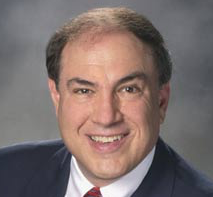Industry Insights
July 14, 2025
Gelman: Asbestos Ban Is a Win for Workers
- National
- - 0 shares
In a significant development for public health and worker safety, the Trump administration has withdrawn its plan to reconsider the Biden-era ban on chrysotile asbestos, the last form of asbestos still imported and used in the United States.

Jon L. Gelman
This reversal comes after a period of uncertainty and public outcry, marking a crucial step toward finally addressing the long-standing threat of asbestos exposure in the United States.
Key takeaway: The Environmental Protection Agency will no longer pursue a notice-and-comment rulemaking to evaluate potential changes to the Asbestos Part 1 Rule, meaning the ban on chrysotile asbestos remains in effect. This decision provides much-needed clarity and stability for the continued prohibition of this dangerous carcinogen.
For decades, asbestos has cast a dark shadow over public health, leaving a devastating trail of diseases. When asbestos-containing materials are disturbed, microscopic fibers are released, which, when inhaled, can become lodged deep within the lungs and other organs, leading to severe and often fatal illnesses with latency periods spanning decades. The primary health hazards include mesothelioma, a rare and aggressive cancer almost exclusively caused by asbestos exposure, as well as lung cancer and asbestosis. There is no safe level of asbestos exposure, and even minimal contact can pose a risk.
The EPA's 2024 rule, which prohibits the importation and ongoing use of chrysotile asbestos, was a landmark achievement. Chrysotile asbestos has been primarily used in products such as diaphragms in the chlor-alkali industry, brake blocks and specialized gaskets. The ban aims to protect individuals from severe health risks, including various types of cancer. While the ban does include phase-out periods for specific uses and does not prohibit existing, already installed products, the administration's decision not to reconsider it reinforces the commitment to worker protection.
This outcome is particularly significant for American workers, who have historically faced disproportionate exposure to asbestos in various industries. The rule also mandates workplace information and training on the health effects of asbestos and the quantities involved, further safeguarding those at risk.
While many developed nations have long enacted comprehensive bans on all forms of asbestos, the United States has lagged. This recent development brings the U.S. closer to alignment with global standards, where more than 50 countries have already implemented full asbestos bans. The ongoing legal challenges from industry groups against the restrictions remain, but for now, the path forward for a safer, asbestos-free future for American workers appears more secure.
Claimants' attorney Jon L. Gelman is the author of "New Jersey Workers’ Compensation Law" and co-author of the national treatise "Modern Workers’ Compensation Law." He is based in Wayne, New Jersey. This blog post is republished with permission.
Advertisements
Columns
- Kamin: Ring the Bells for Settlement Season 12/08/25
- Paduda: Does Comp Care About Workers? 12/05/25
- Sandoval: Throwing Subrogation Under the Bus 12/03/25
- Johnson: Some Thoughts on Apportionment - And SIBTF 11/20/25
- Montgomery: State's First Responders May File Comp Claims for Trauma 11/14/25
- Snyder: Use This New Survey to Negotiate Better 11/12/25
- Holden: Workers' Compensation Act Withstands Another Constitutional Attack 11/11/25
- Gelman: Sherrill's Win Locks in Worker Protections 11/10/25
- Kamin: Newsom Promises SIBTF Reforms in 2026 11/07/25
- Kamin: Comp Costs Hit Highest Combined Ratio Since 2001, WCIRB Says 11/05/25
- Montgomery: DIR to Blow $1.25M on Another Questionable Comp Study 11/03/25
- Wroten: California Sets the Standard as New Study Links Workplace Injuries to Heat Exposure 10/29/25
- Kamin: En Banc Clarifies Policy Reporting Requirements 10/27/25
- Gelman: PTSD-Stricken Officer's Disability Claim Denied 10/22/25
- Snyder: TAG a Structured Settlement Broker 10/17/25
- Snyder: New Medi-Cal Rules Can Affect Your Settlement 10/15/25
- Fish: Guarding Against PTSD Overdiagnosis 10/10/25
- Montgomery: DWC's MPN List Disappears Yet Again 10/08/25
- Ferguson: A Tribute to Thomas Chapman Lynch 10/06/25
- Gelman: Workers' Compensation Lien Secures Damages 10/03/25
Now Trending
- Workers' Compensation News
-
Calif. Privette
Protects Homeowner When Insurer
Hires…
Posted on Dec 4, 2025
-
Calif. Court: WCAB
Has Duty to Flesh Out Witness
Statements When Workers Can't…
Posted on Dec 9, 2025
-
Calif. Worker's
Unreasonable Refusal of Treatment
Dooms Disability Retirement…
Posted on Dec 5, 2025
-
Calif. SCIF:
Ambiguity in Disability
Accommodation Rules Could Hamper…
Posted on Dec 8, 2025
-
Calif. Appeals
Court Nixes $58K Default Over
Procedural…
Posted on Dec 4, 2025
-
Calif. CHSWC Meets
Dec.…
Posted on Dec 3, 2025
-
Mass. Worker's
Unreasonable Conduct Delaying Case
Results in Dismissal of…
Posted on Dec 8, 2025
-
Ntl. Lawmakers
Again Seek to Expand Provider
Options Under…
Posted on Dec 3, 2025
-
Ariz. Court
Rejects Worker's Claim of
Psychological Injury From
Mistreatment by…
Posted on Dec 4, 2025
-
Ohio Court Returns
PTD Application to Commission for
Review of Changed…
Posted on Dec 2, 2025
Jobs
- Workers' Compensation Defense Attorney (REMOTE)
- REMOTE JOB - DEFENSE ATTORNEY - WORKERS COMP SALARY RANGE $200-240K
- Workers' Compensation Analyst
- Workers’ Compensation Defense Attorney - 100% Remote
- In-house REMOTE Workers' Compensation Litigation Attorney
- Defense Attorneys - Remote Work Available
- Workers’ Compensation Attorney Workers' Compensation Jobs
Upcoming Events
Dec 13, 2025
2025 WorkCompCentral Annual Ra
This session offers 4.0 MCLE/LS and Rating Credit. Featured Speakers: Clint Feddersen, Esq.- Atto …
Mar 3-4, 2026
Save The Date! WCRI’s 2026 Ann
Registration will open up in the coming months. We'll see you there! - Leading national workers' …
Mar 5-6, 2026
DWC’s 33rd Annual Educational
Register Now! 2026 conference topics: DWC Update AI with a Claims Focus Medical and Legal Ethics …
Social Media Links
c/o Business Insurance Holdings, Inc.
Greenwich, CT 06836




No Comments
Log in to post a comment